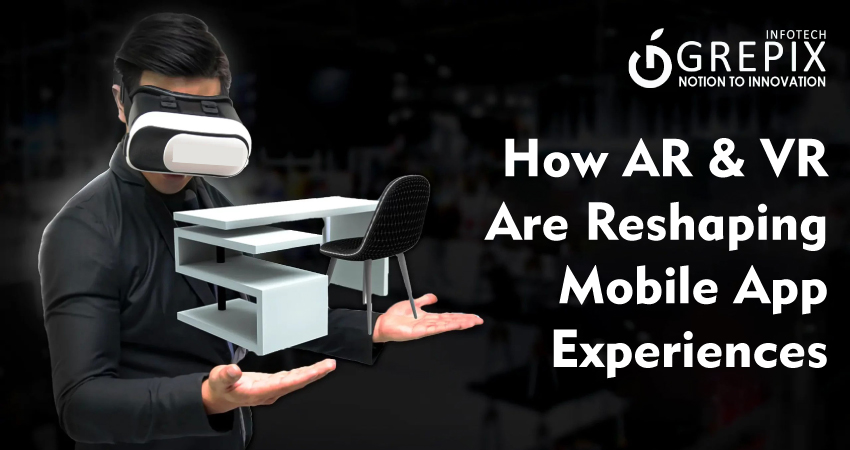How AR & VR Are Reshaping Mobile App Experiences
AR app development and VR apps 2025 are creating immersive app design trends that are revolutionizing how brands engage users on mobile devices. From retail and healthcare to travel and more, these advances are elevating mobile apps from transactional tools into deeply interactive experiences.
The rise of AR app development, VR apps 2025, and immersive app design is fundamentally altering mobile app experiences. Retailers now offer in-app try-ons and virtual stores, healthcare providers deliver interactive medical training and diagnostics, and the travel sector provides virtual tours and planning. By examining real examples, industry statistics, and detailed use cases, this article empowers brands to choose the best immersive app strategy for 2025. Whether solving pain points or boosting brand loyalty, AR apps and VR solutions are the future of mobile engagement.
AR App Development, VR Apps 2025, and Immersive App Design: The 2025 Revolution
Why Are AR & VR Shaping Mobile Now?
In 2025, AR app development and VR apps 2025 are accessible to brands of all sizes, thanks to powerful smartphones and frameworks like Apple’s Vision Pro, ARKit, and Google’s ARCore. Consumer demand and affordable tech mean immersive app design is quickly moving from novelty to necessity across industries
Use Cases & Benefits Across Industries
Retail: Virtual Try-Ons & Interactive Shopping
- Virtual Fitting Rooms: Brands like Nike and Sephora use AR app development to let users “try on” products via their phones before buying. This immersive app design reduces returns and boosts buyer confidence.
- 3D Product Visualization: AR lets shoppers preview furniture in their own spaces or scan barcodes for instant information. VR apps 2025 provide virtual showrooms customers can shop, personalize, and check out in fully immersive environments.
- Case Study: IKEA Place enabled a 25% decrease in product returns by letting shoppers preview furniture at home in AR.
Healthcare: Training, Treatment & Diagnosis
- VR Training Simulations: Doctors rehearse surgeries or practice responses to emergencies in virtual environments, boosting skills safely and efficiently.
- AR-Assisted Surgery: Surgeons use immersive app design to overlay digital models onto real patients for precision navigation.
- Therapy & Pain Management: VR apps 2025 deliver guided meditation or simulated environments for managing pain and anxiety sometimes even in pediatric hospital settings.
- Case Study: VR-based therapy reduced chronic pain in 37% of trial patients at a US medical center in 2024.
Travel: Virtual Exploration & Enhanced Bookings
- Virtual Destinations: AR app development lets users scan landmarks for facts or access app-based audio guides via their phones. VR apps 2025 provide immersive travel previews for hotels, destinations, and entire tours.
- Immersive App Design: Engages would-be travelers before they book, reducing uncertainty and supporting faster decision-making.
- Case Study: A major hotel chain saw booking conversions rise by 18% after launching a VR experience of featured suites.
How AR App Development & VR Apps 2025 Deliver Value
Cost Savings & ROI
- Retail: Virtual try-ons save retailers on return processing and offer a unique selling point.
- Healthcare: Reduces hands-on training costs while minimizing patient risk.
- Travel: Virtual tours connect with global audiences no costly on-site visits required.
User Engagement & Loyalty
- AR app development and immersive app design keep users interacting with the brand, not just browsing and leaving.
- Apps with immersive features report session times 2–3x higher than traditional apps in 2025.
Accessibility & Reach
- Modern AR/VR solutions run on standard smartphones no expensive headsets needed for most uses.
- Immersive app design democratizes advanced features for small businesses, too.
The Road Ahead: What’s Next for AR App Development & VR Apps 2025?
- Niche Innovations: Sectors like manufacturing, banking, and education are seeing tailored AR/VR apps for training, design, and client engagement.
- Mixed Reality UX: Blending AR with AI and IoT for smarter, context-aware apps that interact with both the real and virtual world.
Conclusion
In 2025, AR app development, VR apps 2025, and immersive app design are driving a new era of mobile app engagement. Across industries retail, healthcare, travel brands adopting these technologies see measurable ROI, deeper loyalty, and operational efficiencies. The future of AR app development and VR apps 2025 is brighter than ever as consumer expectations and hardware enhance immersive app design possibilities. Ready to future-proof your mobile strategy and delight customers with cutting-edge experiences? Get in touch with an immersive app expert now and share this guide with leaders aiming to set the standard in mobile innovation
FAQs
1. How can AR app development benefit a retail business?
Retailers use AR app development for virtual try-ons, product previews, and interactive showrooms, driving sales and reducing returns.
2. Are VR apps 2025 practical for healthcare?
Yes! VR apps boost medical training, patient education, pain management, and even remote consultation with proven results in 2025.
3. What are immersive app design best practices for user engagement?
Focus on seamless UI, short learning curves, performance optimization, and integrating real-world utility into every AR/VR feature.
4. Do AR apps require expensive headsets?
Most AR app development for mobile targets smartphones, not just headsets, making it affordable and accessible to all users.
5. Which industries will lead in VR apps 2025?
Retail, healthcare, travel, manufacturing, and education are the biggest adopters, with banking and real estate rapidly implementing immersive app design.







